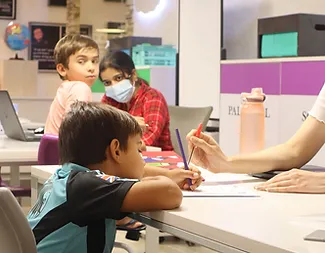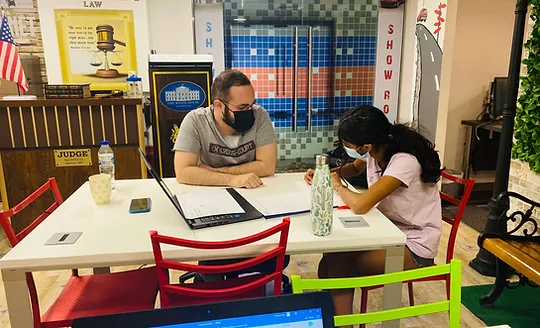English Literature Courses

English Literature Courses for Early Ages (Age 3 To 5)
Improve ME’s English Literature programme for early years is fun and engaging. It aids our young learners to understand the relationship between spoken words and their written form, whilst enhancing their learning concentration. Students are focused to develop interest through a range of worksheets for aiding their alphabet recognition (both sound and name of the letter). The work not only gets increasingly challenging but also continues to add on to learning new modes of language through reading, writing and vocabulary expansion.
English Literature Courses for Primary (Age 6 - 11)
Primary EngLit functions on the foundation for each student to work at the best level and ability, without being limited by age or school year level. We provide them with the accurate base to develop at a level that matches their potential, through exposure to a range of challenging literary reading and creative writing topics. Our aim is to have a child read fluently and thoroughly, understand each passage/task and establish their own interpretations, while learning expressions for writing a well-developed, concise and grammatically correct written passage
Sample Worksheets:
English Literature Courses for Middle School (Age 10-15)
Students also start to work on their ability to express impressions of texts and to understand the sentiments of characters. This includes variations of mood and action, and how that is expressed. They learn how to summarise text, and identify keywords and their relationship to each other. Other key skills that are expected:
Students should understand how to organise information and ideas, using structural and grammatical features to support the coherence and cohesion of texts.
Should read critically and make comparisons across texts.
Planning, building a draft, and editing whilst, considering how their writing reflects the audience and purpose for which it was intended.
Students should use the full range of punctuation accurately including brackets, colons, semi-colons, ellipsis and dashes
Can comment on the setting, plot and characterisation in a text, and the effects of these
These components encourage a wide aspect of the English language, whereby students are comprehensive and are adapting to the dynamism of the language between differing texts. Importantly, all these components do contribute to a well-rounded comprehensive student within the language incorporating all key aspects (Speaking and Listening, Reading, Writing and finally, Spelling Grammar and Vocabulary.)

English Literature Courses for Senior (Age 15-18)
Improve ME enables each student to read and infer texts through applying analytical skills. Students not only learn to read for connotation and denotations but also build a strong base for locating referential details. Our sessions empower these young writers to build their transactional and imaginative writing skills as they develop independence and the ability to drive their own learning.
The greater objective is to manipulate the skills obtained in previous years, to become more analytical, critical and objective when
The sessions entail writing on varied topics to familiarise your child with different forms of writing. Students will build upon these skills by:
Read and understand a variety of texts, and interpret information, ideas and perspectives.
Understand and analyse writing styles.
Explore links and connections between writers’ ideas and perspectives.
Clear, effective communication, in an imaginative manner whilst appropriately applying the form, tone, and register of writing for specific purposes and audiences.
Using a range of vocabulary and sentence structures, with appropriate application of SPaG.
Reviews
Our Happy students?
 Samiah Khurana2022-11-23i do math and english and classes here help me improve
Samiah Khurana2022-11-23i do math and english and classes here help me improve Mikayel Ali2022-11-23Math and science is good and MR Ahmed is very nice 👍
Mikayel Ali2022-11-23Math and science is good and MR Ahmed is very nice 👍 Lamia Almarri2022-11-23Amazing place for Maths and science!They have helped me improve my studies and grades. Thank you improve me!
Lamia Almarri2022-11-23Amazing place for Maths and science!They have helped me improve my studies and grades. Thank you improve me! Ahmed Dogar2022-09-24Karuna is currently my English Literature teacher , She is very helpful and Kind , Helped me in my school assessments which I am confident I will do well in thanks to her knowledge of things like context and alternative interpretations.
Ahmed Dogar2022-09-24Karuna is currently my English Literature teacher , She is very helpful and Kind , Helped me in my school assessments which I am confident I will do well in thanks to her knowledge of things like context and alternative interpretations. Hamdan Shaikh2022-09-16I do maths and science tuition and I really like how all the teachers provide me with notes and practice questions which really help me understand and improve in topics. Everything I learn during the tuition I am clear with. I do not hesitate to ask any of my doubts and I really like the learning environment over here. Thank you.
Hamdan Shaikh2022-09-16I do maths and science tuition and I really like how all the teachers provide me with notes and practice questions which really help me understand and improve in topics. Everything I learn during the tuition I am clear with. I do not hesitate to ask any of my doubts and I really like the learning environment over here. Thank you. Armaan sajnani2022-09-15I do math and economics at this institute and they have helped me improve a lot in many areas of my work … the teachers are very helpful and kind and have a different connection with the students which help me learn on another level would recommend this to everyone from age 3 to 18
Armaan sajnani2022-09-15I do math and economics at this institute and they have helped me improve a lot in many areas of my work … the teachers are very helpful and kind and have a different connection with the students which help me learn on another level would recommend this to everyone from age 3 to 18 Karine Mansour2022-07-28Love how unique and beautiful this place is. Amazing people that one can learn a lot from. Highly recommended.
Karine Mansour2022-07-28Love how unique and beautiful this place is. Amazing people that one can learn a lot from. Highly recommended. dide oz2022-07-02We have absolutely been very fortunate to be a part of ImproveMe. Our huge thanks specifically go to Jason for being a great tutor and mentor to our son. You are doing great, please keep-up your high quality. Kind regards, Ozel Family
dide oz2022-07-02We have absolutely been very fortunate to be a part of ImproveMe. Our huge thanks specifically go to Jason for being a great tutor and mentor to our son. You are doing great, please keep-up your high quality. Kind regards, Ozel Family

